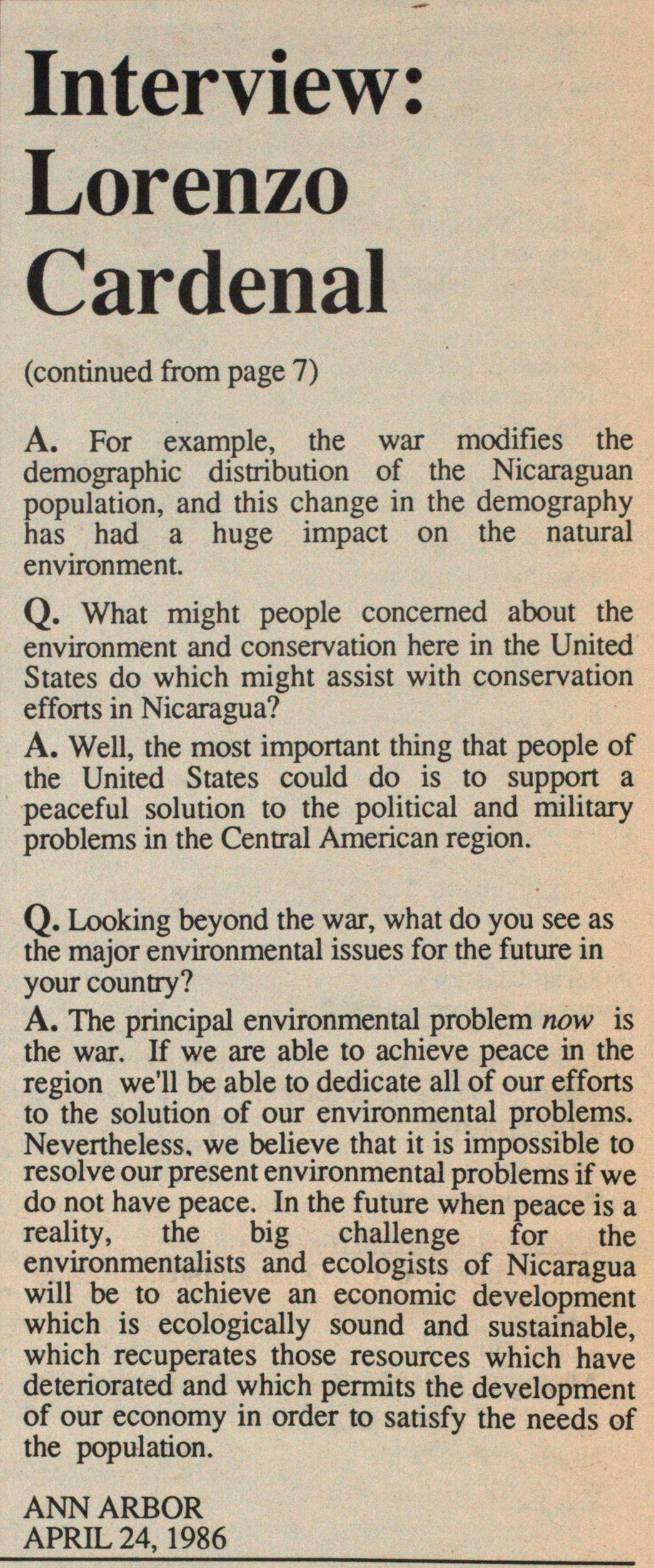Interview With Lorenzo Cardenal



Interview with Lorenzo Cardenal: Director of the Nicaraguan National Park Service and President of the Nicaraguan Association of Biologists and Ecologists
Interviewer: John Hough
Translation: Cinder Hypki
Q. Lorenzo, what are the major environmental problems that you see in your country today?
A. The environmental problems of Nicaragua are very similar to those of other countries in Latin America and the Third world [in general], because they have be produced by similar social, economic, and political phenomena.
Q. What are the manifestations of these phenomena in the environment?
A. Practically speaking, all of our natural resources have suffered the impact of the historically bad use which has been made of them. The richest agricultural soils of the country are extremely eroded by the wind and rains. Our forests have been cut in order to use the land for agriculture and cattle grazing. Between 1952 and 1984, more than 3 million hectares of land were deforested in Nicaragua; an annual deforestation rate of 100,000 hectares. In other words, Nicaragua has been losing 2% of its entire forest cover.
Q. What are the results of that deforestation?
A. The deforestation in humid tropical-forest watershed areas has caused an alteration in the water cycle of some of the largest rivers in the country. It has caused the sedimentation [siltation] of rivers, which are now contaminated with soil particles. This in turn has resulted in the loss of potential fishing resources in these rivers. Deforestation has also caused he loss of agricultural lands when the rivers flood each year [because deforested lands in the watershed areas have less capacity for absorbing the torrential tropical rains]. In addition, the level of the groundwater table [subterranean water supply] has diminished in some areas of the country. Many estuary ecosystems have been destroyed due to the buildup of the sediments, which the rivers carry out to the river mouths.
Q. In addition to these problems, is it true that there have also been problems with agricultural chemicals?
A. Of course. The intensive use of pesticides on the huge plantations of monocultures [single crop areas] for the agro-export industry have had a terrible impact on our soil, groundwater, and the standing water in our lakes and rivers. This has caused the disappearance of many species of local fauna.
Q. In addition to the effects on the animals, what are the effects of this environmental degradation on the people of the country?
A. Obviously, the pesticides become integrated into the food chains; upon doing so, they contaminate human food sources. In the past, there was not an adequate control over the use of these chemicals, and many farmworkers who used pesticides were poisoned.
Q. What sort of strategies are being adopted now to reduce these problems?
A. In the first place, the Nicaraguan government declared sovereignty over its natural resources. This means that the decisions concerning the use of our natural resources are made in the interests of the Nicaraguan people, and no longer in the interests of outsides. This is important because it now permits us to initiate programs to recuperate our natural resources, for example, integrated pest management programs, the protection of wildlands, planning for the use of watershed areas, reforestation, the improvement of genetic forest resources, projects to clean up our bodies of water. Others are aimed at improving the environmental conditions of the population in order to reduce the incidences of infectious diseases, infant mortality rates and unsanitary conditions, as well as the initiation of a type of popular environmental education which is indispensible in creating understand of and support for these projects.
Q. What has been the public reaction to these sorts of projects in terms of people's traditional resource management activities?
A. The majority of the Nicaraguan population continues its traditional forms of land use because the Nicaraguan government has not yet been able to change the ways in which people think about the relationship between man and nature, people and environment. Many of the environmental projects of the Sandinista government have enjoyed much popular support from the Nicaraguan people, but there are many which are not yet fully understood by the population.
Q. One of these environmental projects which you are proposing is to set aside up to 18% of the country's land area as national parks. Will this land be exclusively designated as national parks, or does this include other forms of protective land use?
A. This doesn't exclusively mean national parks by any means. The designation of the lands as national parks ensures an area the highest degree of protection. We are trying to create areas with other types of criteria for protection so that a wise use and management of these areas will be possible with the support of the people.
Q. What sort of benefits do you see coming from these protected areas then?
A. Besides the traditional benefits like recreation, environmental education opportunities, rest areas etc., which are derived from protected areas, we would like them to also contribute to the national economy. Our natural [forested] areas protect the soils from erosion, they protect the sources of rivers in the watershed areas and the genetic resources of flora and fauna.
Q. Who do you see as being the main beneficiaries of this natural resource protection and management?
A. Definitely, the primary beneficiaries are the Nicaraguan people and all generations of Nicaraguans yet to come.
Q. Are you referring to the people living in the rural areas or the urban areas? Who specifically?
A. The benefits of a truly good system of natural areas conservation must be the entire population. Possibly, the direct economic benefits derived from natural areas will be to the surrounding local communities. But the entire population would benefit as well, from having a well-organized system of protected areas.
Q. Are there any popular conservation or environmental groups in the country which might support these environmental policies of the government?
A. The preoccupation about natural resources in our country is truly a very recent phenomenon; because of this, the environmental groups in the country are just beginning to get organized. By way of illustration, I should mention the Nicaraguan Association of Biologists and Ecologists, which brings together the professionals dedicated to biology, ecology, and other related fields. There is also a student group called Collective Habitat, which brings together ecology students at the University of Central America in Managua and works in disseminating scientific information and carrying out popular environmental education.
Q. What sorts of activities does the Association of Biologists and Ecologists engage in?
A. At the present time, the Association is attempting to organize a meeting of biologists and ecologists throughout Central America, to be held in November of this year, tentatively. This meeting has as its objective the opportunity for representatives from environmental organizations all over Central America to discuss the major environmental problems of the region. We will attempt to design together a possible action strategy to find solutions to these common problems. Other projects of the Association for this year include organizing the first meeting on Fisheries at the national level and participating in the world-wide Earth Day campaign. In addition, the Association provides consultation to governmental ministries involved in development projects which have an environmental impact.
Q. What is the relationship between the Association and the government?
A. The Association is an independent, autonomous organization which depends financially on dues from the membership, which is made up of professionals. It is part of the National Federation of Professional Associations, which has 22 members organizations from distinct professions. This Federation has a representative in the National Assembly.
Q. Does the government listen to suggestions from the Association of Biologists and Ecologists regarding its development projects?
A. On some occasions the government itself has approached the Association for advice on its projects; the Association is well respected within the country.
Q. What is the impact of the was on these environmental issues in Nicaragua?
A. We could say that there are three types of impacts. First, the direct impacts caused by direct military activity on the natural resources. This has not yet manifested itself in Ncaragua with the same intensity as it has in Vietnam or in El Salvador. Another effect of the war in Nicaragua on the environment is the damage it has done to the government's environmental projects--assassinating environmentalists, destroying equipment, and impeding the development of the projects. Lastly, we can speak of the global effects of...for example, the war modifies the demographic distribution of the Nicaraguan population, and this change in the demography has had a huge impact on the natural environment.
Q. What might people concerned about the environment and conservation here in the United States do which might assist with conservation efforts in Nicaragua?
A. Well, the most important thing that people of the United States could do is support a peaceful solution to the political and military problems in the Central American region.
Q. Looking beyond the war, what do you see as the major environmental issues for the future in your country?
A. The principal environmental problem now is the war. If we are able to achieve peace in the region we'll be able to dedicate all of our efforts to the solution of our environmental problems. Nevertheless, we believe that it is impossible to resolve our present environmental problems if we do not have peace. In the future when peace is a reality, the big challenge for the environmentalists and ecologists of Nicaragua will be to achieve an economic development which is ecologically sound and sustainable, which recuperated those resources which have deteriorated and which permits the development of our economy in order to satisfy the needs of the population.
ANN ARBOR
APRIL 24, 1986